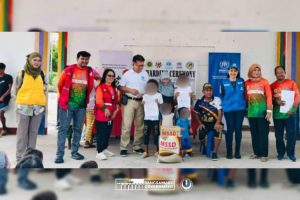
The Ministry of Social Services and Development (MSSD), in partnership with the United Nations High Commissioner for Refugees (UNHCR), distributes birth certificates and welfare goods to Badjao children on December 17, 2024, in Simunul, Tawi-Tawi. (Photo courtesy of MSSD-BARMM)
SIMUNUL, TAWI-TAWI- In pursuit to providing equal social welfare services and promoting inclusivity amidst diversity, the Ministry of Social Services and Development (MSSD) distributed birth certificates and welfare goods to 100 Badjao children in this town on Dec. 17, 2024.
The distribution was a result of a collaborative effort of MSSD, the United Nations High Commissioner for Refugees (UNHCR), and the Local Government Unit (LGU) of Simunul.
Accordingly, most Badjao children experience displacement in the community due to their unique ways of living; thus, this step is a momentous occasion for them, as the document is essential to facilitate access to most government services such as education, healthcare, and social protection.
Despite their unique title as “Sea Gypsies,” Badjao children are entitled to the same rights as all children. According to the United Nations Children’s Fund (UNICEF) in “The Convention on the Rights of the Child,” they have the Right to Name and Nationality, ensuring their recognition by the government, and the Right to Identity, which allows them to assert their individuality.
MSSD emphasized that without the birth certificates as legal identity, an individual may face challenges in accessing basic services.
“A birth certificate is more than a piece of paper. It’s a gateway to opportunities and a foundation for a dignified life,” said Leah Duhaylungsod, the Municipal Social Welfare Officer of Simunul.
She added that the LGU was grateful for the success of the initiative and emphasized the transformative impact of birth registration on the Badjao community.
This initiative falls under the MSSD’s Children and Youth Welfare Program (CYWP) which aims to improve the holistic growth and development of children, adolescents, and young people in the Bangsamoro region by addressing the survival, development, protection, and participation needs of children in the BARMM. (Laila Aripin/BIO with reports from MSSD)







